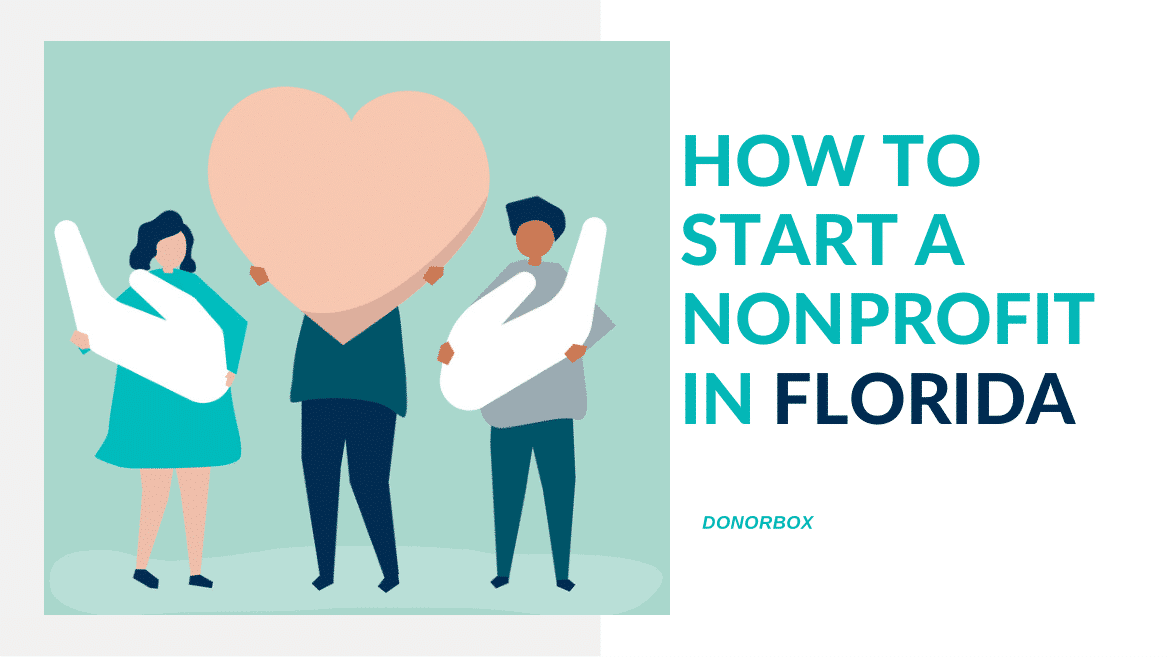There are approximately 1.97 million nonprofits registered in the United States. The individuals who started these nonprofit organizations hope to change their communities or even the world. They have far-reaching goals for others and low expectations of making money for themselves. Starting a nonprofit can be rewarding, but the process of setting one up can feel daunting.
Like all states, Florida has its own laws and regulations that must be followed when forming a new nonprofit corporation. We have created a detailed step-by-step guide to follow when starting a nonprofit in Florida. We hope this list helps make embarking on this adventure less confusing.
How to Start a Nonprofit in Florida in 10 Steps:
1. Name your organization
The first step to start a nonprofit organization in Florida is finding the perfect name. Your name should be memorable and speak to the community you hope to serve. It is best to involve a few key players in this decision. Find what name works best for your organization since this is your calling card to the world.
Once you decide on your name, you may think you are done. But the process of claiming a name is a bit more complicated than you may expect.
When choosing a legal name for your organization, it cannot conflict with any other organization registered in the state. The name also cannot contain words suggesting an affiliation with government agencies or contain the words “company” or “Co.”
Your nonprofit will be a corporation in the state of Florida and must include either: corporation, incorporated, Corp, or Inc.
When you have chosen your name, visit the Florida Department of State to search their system. If the name is available, you can claim it immediately as your own.
2. Name your incorporators and directors

The leadership of your organization will determine your success. The decisions you make here can be long-lasting. As the organization grows, changing leadership becomes more difficult. Nonprofit leadership is responsible for the organization’s programs, budgets, fundraising, and more. They will also have a financial responsibility to the organization. Choosing a team that supports the mission of the organization is crucial in this step. Finding a team that brings a range of skills and community connections will also be essential.
You may have many reasons for choosing your incorporators and directors. But the state of Florida has requirements for these roles as well.
Choosing an Incorporator
An Incorporator is responsible for setting up the corporation at the beginning. They will sign and deliver the Articles of Incorporation for your nonprofit. The incorporator does not have a leadership role. They are solely the person in charge of filing and interacting with the state of Florida.
Choosing your Directors
Your Directors will make up the governing board of your organization. These directors will be the final decision-makers and stakeholders. You must state the number of directors your organization will have in the Articles of Incorporation or your organization’s bylaws.
The state of Florida requires a nonprofit organization to have at least three directors. These directors must be at least 18 years old and unrelated. One director can be 15 years or older if permitted by the organization’s bylaws and board of directors. But cannot be counted towards quorum.
There are no residency or membership requirements for directors in Florida. Local nonprofits will not be concerned with this information, but the lack of a residency requirement is good news for national organizations hoping to base themselves in Florida.
Your board members will set policies, define the organization’s mission. They will create strategies, and oversee programs and fundraising activities for your organization. As the head of your board, Officers have additional responsibilities.
Florida also requires nonprofits to have one officer to prepare the minutes of the board of director meetings. This officer will also be responsible for preparing membership meeting minutes if your organization has members. Officers will be elected by the board and have a term limit of one year.
3. Appoint a Registered Agent
A registered agent is an individual or business that handles your organization’s legal documents. They must be a Florida resident or have an office located in Florida that is open during regular business hours.
Florida does allow nonprofits to use a Registered agent service who have an office in the state. These services send updates to the organization to remind them of filing requirements. They can also help find accountants, legal professionals, and keep a backup of corporate documents.
4. File Florida Articles of Incorporation
All corporations in Florida must file an Articles of Incorporation. Florida has specific requirements for your Articles of Incorporation.
The Florida Department of State has detailed instructions on how to file your AOI.
As a nonprofit, your Articles of Incorporation must include the following:
- Corporation Name
- Principal Place of Business
- Mailing Address
- Registered Agent Name and Address
- Corporate Purpose
A nonprofit is required to list a specific purpose
Most banks will require this information to be stated in the Department of State’s records
Your answer can include “as stated by the bylaws” or “elected at the annual meeting.”
This is the date the Division of Corporation receives and files your Articles of Incorporation
Nonprofits can file their AOI online, and fees can be paid by credit card. Response time is within one to three days if done online.
A PDF application can also be found online to fill out and mail to the Division of Corporations. All checks and money orders are payable to the Florida Department of State and drawn from a US bank. Applications sent by mail will have a turnaround time of eight to seventeen days.
Filing fees for your organization’s Articles of Incorporation are listed below:
- Filing Fees: $35
- Registered Agent Designation: $35
5. Apply for an Employer Identification Number (EIN)
An Employer Identification Number or EIN is assigned to your corporation by the IRS. Use this to hire employees, open a bank account, apply for tax-exempt status, and submit tax forms. To apply for your EIN, IRS Form SS-4 must be filed online or by mail.
6. Establish Nonprofit Bylaws
Your bylaws are where you will declare how and when your Officers and Directors are elected. Bylaws also establish how and when your board of directors will hold meetings. It also lays down what qualifies as the quorum in these board meetings. Your organization’s membership structure, and other organization operations.
Your bylaws will be used to determine your level of accountability and transparency. These will be especially important when applying for grants, sponsorships, or finding major donors. A well-managed organization will have greater success when looking for outside funding.
The IRS does not need any specific language in your bylaws. But there are best practices that others have shared to ensure their success. We have written about these best practices in our blog. The Florida Association of Nonprofits also has several samples of bylaws online that may help you create your own.
7. Apply for Federal and Florida State Tax Exemptions

Tax-exempt status is a difference between nonprofits and other corporations. Until this step, you have filed as a corporation. This step is essential to creating your nonprofit in the United States and Florida.
How do you apply for federal tax exemption?
All nonprofits applying for tax-exempt status must request an exemption under Section 501(c) of the Internal Revenue Code – FORM 1023. As of January 31, the IRS requires this form to be filed online at www.pay.gov.
Your tax exemption may take several months for the IRS to process, but you can continue state and county tax-exempt filings while you wait.
There are fees for filing for tax-exempt status with the IRS. If your file with Form 1023-EZ, a user fee will be $275. If you do not qualify for Form 1023-EZ, your user fee will be $600.
How do you apply for state tax exemptions?
Requirements for filing for tax-exempt status vary from state to state. In the state of Florida, a nonprofit corporation is automatically exempt from Florida’s corporate income tax unless it has “unrelated trade or business income.”
All nonprofit organizations that qualify for tax-exempt status with the IRS are also exempt from state sales taxes in Florida. A Consumer’s Certificate of Exemption must be obtained by your nonprofit to get a sales tax exemption on items and services used on the organization’s nonprofit activities. This certificate is valid for five years.
8. Register for Charitable Fundraising
Now that your organization has filed for tax-exempt status with the IRS and the state of Florida, you must plan for future fundraising efforts. Your fundraising efforts can be hampered by shoddy preparation in this step.
Requirements for registering as a charitable foundation are another area where the laws vary from state to state. In Florida, nonprofits must register with the Department of Agriculture and Consumer Services annually before soliciting any Florida resident.
Filing fees for charitable fundraising are based on your organization’s financial report from the preceding year. Newly formed organizations with no financial history must file a proposed budget. We have provided a Guide to Nonprofit Budgeting which includes a free template.
9. Create a Nonprofit Bank Account
Like any corporation, you will need to start a separate bank account for your nonprofit organization. All US banks will require you to have the following:
- A copy of your nonprofit’s Articles of Incorporation
- A copy of your nonprofit’s bylaws
- Your nonprofit’s EIN
Some banks may ask that you bring a resolution authorizing you to open the account if you have several directors or officers. In the state of Florida, you are required to have at least three directors, so it is best to have this resolution ready.
10. Submit an Annual Report

At the end of each fiscal year, Florida requires nonprofit organizations to file annual reports with the Department of State. Creating an Annual Report may seem unimportant initially, but it is an essential tool in your fundraising toolbox.
An Annual Report gives your organization the opportunity to show donors how you have succeeded in reaching your goals. Since your organization is just starting, this is a unique opportunity to plan for the ideal fundraising year. By breaking down your target market, your fundraising goals, and your team, you can get a head-start on plans for donor outreach, volunteer recruitment, and community partnerships.
Now that you know the importance of an Annual Report for your fundraising efforts, the state of Florida’s requirements will be easy.
What are the Florida state requirements for your Annual Report?
Your organization must file online at the Florida Department of State’s website by May 1st each year. Florida requires Annual Reports to include information about your registered agents and your officers’ and directors’ names and addresses. You must keep this information up to date and change the state’s records within 60 days of any changes to your board. The filing fee for an annual report with the Department of State is $61.25.
After a successful year of fundraising, you will be ready to file your Annual Report with the state and publish and market it to potential donors. We’ve written a Step by Step Guide to Writing an Effective Nonprofit Annual Report to help when you are ready.
Conclusion
Although starting a nonprofit can be challenging, but the process of filing paperwork with the state should not hold you back. The state of Florida makes this process straightforward and easy to access. We have laid out the steps in this order to make the process of starting a nonprofit in Florida easier. Many of the steps you take at the beginning will help you later in the process.
Starting a nonprofit is more than just filing paperwork. With strong leadership at the helm and a meaningful purpose, an organization will succeed in its operations and fundraising. For further information on starting a nonprofit, visit our other blog post on the subject.
FAQs
1. How much does it cost to start a nonprofit in Florida?
To start a nonprofit, Florida’s IRS and state require your organization to file several online forms. The following fees are required to file your Articles of Incorporation, apply for federal and state tax exemptions, apply to solicit donations and file an Annual Report.
- Articles of Incorporation
- $35 filing fee
- $35 registered agent fee
- Federal & State Tax Exemptions
- $600 federal tax exemption fee or
- $275 federal tax exemption fee (for smaller organizations)
- Solicitation of Contributions Registration Application. Fees are based on contributions received in the prior fiscal year:
- Less than $5,000 without paid officers: $10
- $25,000 or less, no compensated employees: $10
- $5,000 or more, less than $100,000: $75
- $100,000 or more, less than $200,000: $125
- $200,000 or more, less than $500,000: $200
- $500,000 or more, less than $1,000,000: $300
- $1,000,000 or more, but less than $10,000,000: $350
- $10,000,000 or more: $400
2. How long does it take to start a Florida nonprofit?
If you file online, Florida will process your Articles of Incorporation within 1-3 days. The process for a tax exemption with the IRS can take several months to process. Other applications will have an immediate response.
3. Do Florida nonprofits need a Registered Agent?
Yes, Florida requires a nonprofit organization to appoint and maintain a registered agent to receive legal notices from the state. Updates must be filed within 60 days of the change.
4. Should Florida nonprofits register as a charity?
Yes, Florida requires nonprofits to register as a charity before soliciting any donations.
5. How many board members are required for a nonprofit in Florida?
Florida requires a minimum of three board members upon formation.
6. Can an LLC be a nonprofit in Florida?
A limited liability company (LLC) or a Low-Profit LLC can exist as a nonprofit limited liability company if the LLC is completely owned by a single tax-exempt nonprofit organization, and the LLC meets the specific requirements.
Most people find the process of forming an LLC nonprofit too complex. Because all of the members (owners) of the LLC nonprofit must also be tax-exempt nonprofit organizations themselves, this does not make sense on most occasions.
7. What are the mandatory forms for creating a Florida nonprofit?
- Register a name with the Florida Department of State
- File Florida Articles of Incorporation
- Apply for an EIN with the IRS
- Establish your nonprofit bylaws
- Request exemption of federal tax under the 501(c) of the Internal Revenue Code
- Obtain a Consumer Certificate of Exemption
- Register as a charity with the Florida Department of Agriculture and Consumer Services






